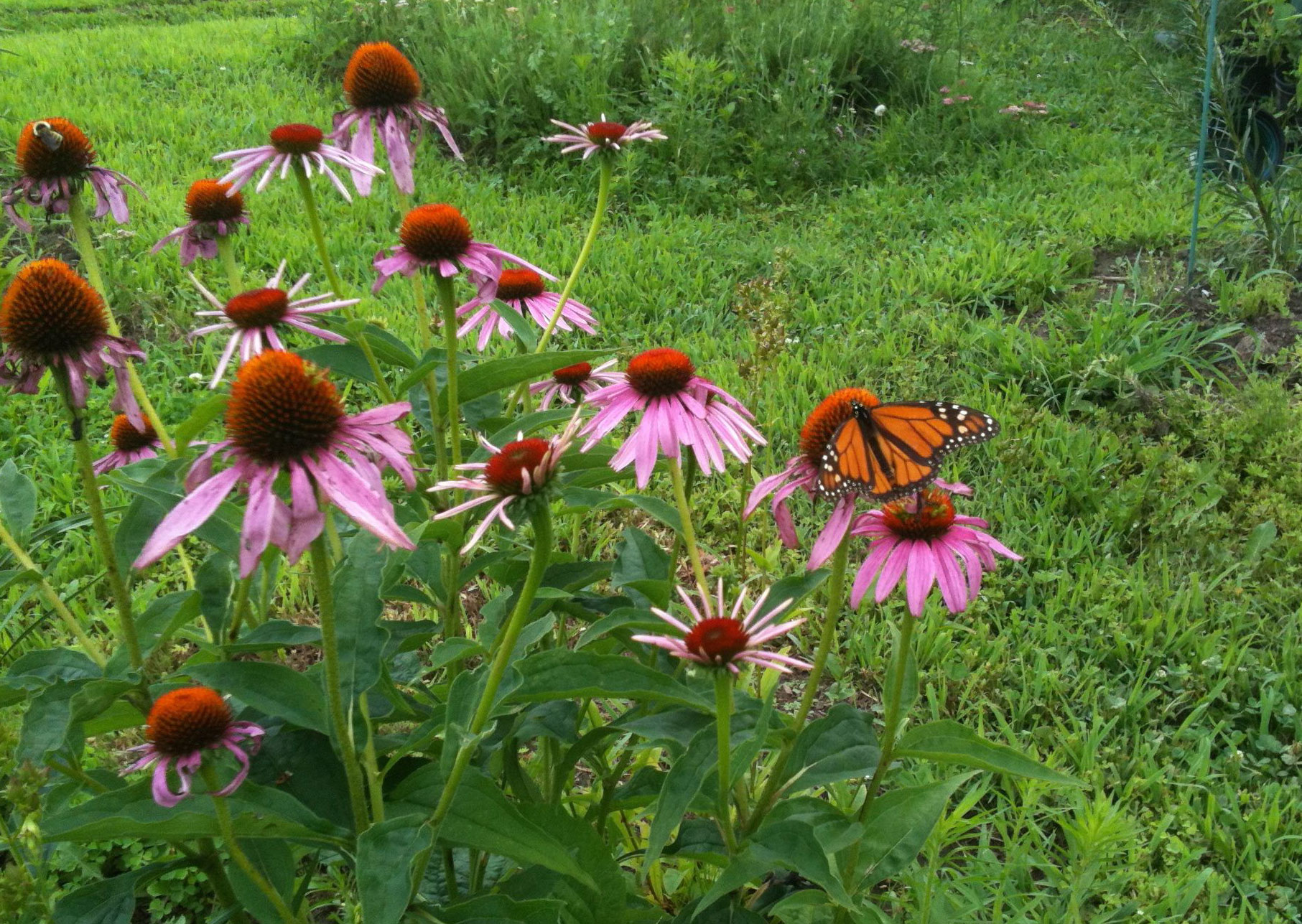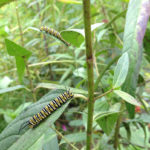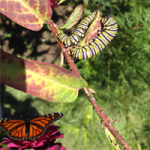Monarchs need milkweed... and more
Preparations

Here’s what we are doing to prepare for Monarchs: to supplement the established milkweed throughout the farm, we have planted a few hundred small pots as seedlings. We hope to sell these to local gardeners, but will incorporate any unsold seedlings into the habitat. The more milkweed we offer, the more caterpillars we host.
Our first Monarch sighting is usually after June 15. Then as of mid-July, sightings became more frequent. From mid-August until early November, we expect to see multiple Monarchs every day. In addition to visiting Asclepias (milkweed) plants, the adults have been seen sipping from Zinnias, Tithonia (Mexican sunflowers), Comfrey, Eupatorium (Joe Pye Weed), Echinacea, Veronicastrum…
We are grateful to all who have purchased seeds from us to help strengthen the Monarch corridor up the east coast.
How to support Monarchs
Milkweed is the only plant on which Monarch butterflies lay their eggs.
 As of spring 2014, reports documented that milkweed—which used to be common along the edges of farmland—has been mostly eliminated from the central U.S. due to modern mega-farming. Our farm—and our seed customers!—are part of an effort to restore Monarch migration corridors in the U.S. In 2019, reports are that the western Monarch population is alarmingly small; but the eastern Monarch population is larger than previous years.
As of spring 2014, reports documented that milkweed—which used to be common along the edges of farmland—has been mostly eliminated from the central U.S. due to modern mega-farming. Our farm—and our seed customers!—are part of an effort to restore Monarch migration corridors in the U.S. In 2019, reports are that the western Monarch population is alarmingly small; but the eastern Monarch population is larger than previous years.
Adult Monarchs need more than milkweed.
Adult Monarch butterflies need sources of nectar for strength and good health. They prefer to stand on broad, flat blossoms as they sip. In our pollinator habitat, we have observed that adult Monarchs lay their eggs on the Asclepias plants, and refresh themselves on other, nearby, nectary flowers.
We offer for sale seeds of two varieties of milkweed (Asclepias) and a collection we call the Monarch Supplement (three varieties of flowers our Monarchs love). We suggest you plant them together. Echinacea is a perennial and will bloom first, for the earliest Monarchs. Zinnias are a fast-growing annual that has a long bloom season; these fill the nectar need for the long middle period. Finally, Tithonia, another annual, will overlap with the Zinnias and continue on until the first hard frost. We had some Monarchs as late as November last year.
Please plan to save seeds from your plantings and help spread them to others. These are open-pollinated seeds. Be patient: some perennial plants may not appear until the second year.
Buy Milkweed Seeds (or seedlings, if you’re local)
We are offering seeds we hand collected from our pollinator habitat in Hadley, Massachusetts (Zone 6) (Asclepias incarnata and Asclepias syriaca).
PLEASE NOTE: Milkweed seeds should not be eaten, and the milky sap of the plant can irritate the eye. The reason Monarchs rely on milkweed for their young is that toxins in the milkweed plant render the caterpillars and butterflies toxic to vertebrate Monarch predators such as birds and mice!
Plant spacing is one plant per 1–2 ft. Plant “island” clumps so the critters don’t burn precious calories traveling to the next blossom.
We planted trays of 300+ seedlings for summer 2018. Instead of selling them as we had intended, mother Monarchs went crazy, laid eggs on most of those, and when those little caterpillars hatched, they consumed the entire crop! Plant lots of milkweed—the first year, the plants will be smallish; in subsequent years, the established plants will be able to support more caterpillars.
If you want a great project for your school, camp, or gardening group, consider pre-ordering our seedlings and their companion plants (zinnias, tithonia, or echinacea). NOTE: We plant these trays in January, so you can transplant them in late May/early June. Email us to reserve your trays during the dark days of December and January! Sorry, we cannot ship seedlings. Contact us with your questions and ideas: email thatsaplentyfarm@gmail.com or call Michael’s cell: 413.320.5953
Then buy the Monarch Supplement
 A collection of three proven Monarch butterfly favorites: Giant zinnias, Mexican sunflowers (Tithonia), and Purple coneflower (Echinacea purpurea). On our farm, these three plants bloom in overlapping succession (Echinacea, Zinnia, Tithonia), and provide nectar calories to the adult Monarchs all the way through the season until frost.
A collection of three proven Monarch butterfly favorites: Giant zinnias, Mexican sunflowers (Tithonia), and Purple coneflower (Echinacea purpurea). On our farm, these three plants bloom in overlapping succession (Echinacea, Zinnia, Tithonia), and provide nectar calories to the adult Monarchs all the way through the season until frost.
The image above shows an adult Monarch sipping from a zinnia as two Monarch caterpillars munch on milkweed. Read more about this collection in the “Store”.
Click “STORE” in the top menu to purchase milkweed seeds.
Questions? email thatsaplentyfarm@gmail.com
